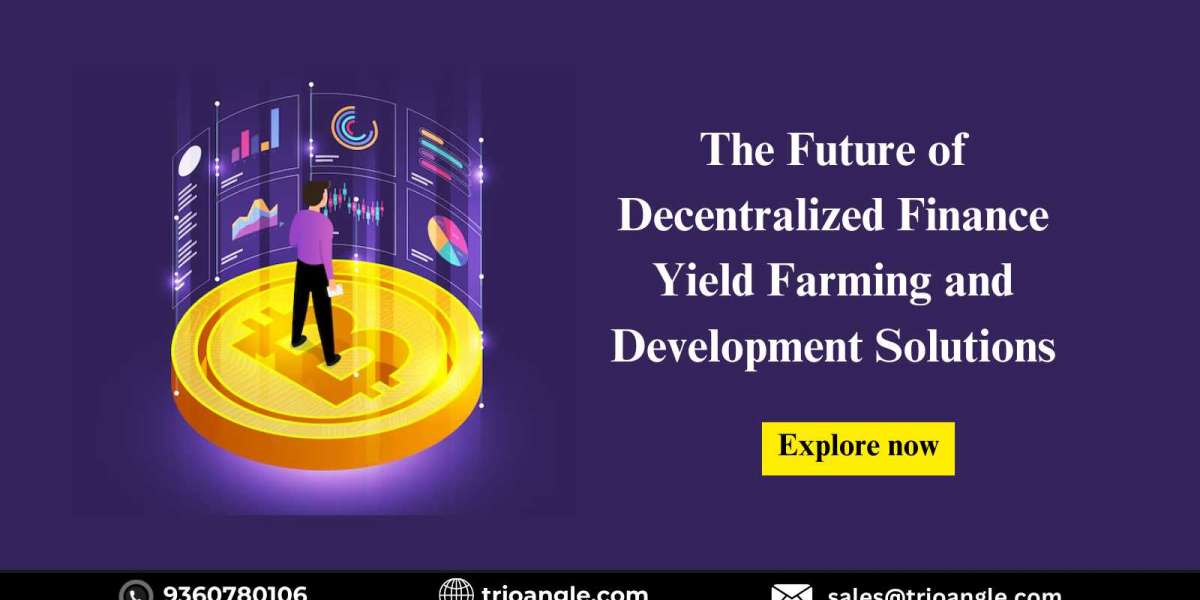Decentralized Finance (DeFi) has taken the financial world by storm, offering users innovative ways to engage with financial services without intermediaries like banks or traditional institutions. One of the most popular and profitable avenues in DeFi is yield farming, which has captured the attention of crypto investors, developers, and innovators alike. As the DeFi space continues to evolve, the future of yield farming looks incredibly promising, driven by technological advancements, increasing user adoption, and the continuous growth of decentralized ecosystems.
In this blog, we will explore what DeFi yield farming is, how it works, and how development solutions are shaping its future, enabling users to maximize their returns while maintaining decentralization and security.
What is DeFi Yield Farming?
Yield farming, also known as liquidity mining, involves providing liquidity to decentralized platforms in return for rewards, often in the form of tokens. In simpler terms, users lend or stake their assets (such as cryptocurrencies) into a liquidity pool to help facilitate decentralized lending, trading, or borrowing. In exchange, they earn rewards, typically a combination of fees and newly minted tokens. This method allows users to passively grow their crypto portfolios, similar to earning interest on a traditional savings account, but with much higher potential returns.
For example, on decentralized exchanges (DEXs) like Uniswap or Sushiswap, users can provide liquidity by pairing two cryptocurrencies (say, Ethereum and USDT) and adding them to the exchange’s liquidity pool. In return, liquidity providers receive a portion of the transaction fees generated when other users trade on the platform.
The appeal of yield farming lies in its ability to generate passive income from existing crypto assets while remaining fully decentralized. Unlike traditional banking systems, where users must trust centralized institutions, DeFi protocols are built on blockchain technology, which ensures transparency, immutability, and censorship resistance.
The Future of DeFi Yield Farming
The future of DeFi yield farming appears to be headed toward several exciting developments. As blockchain technology and decentralized finance continue to mature, we can expect the following trends:
1. Greater Interoperability Between Chains
One of the primary challenges of DeFi yield farming today is the limited interoperability between different blockchain networks. Most platforms and liquidity pools are confined to specific chains like Ethereum or Binance Smart Chain. However, as the industry grows, cross-chain solutions are becoming more feasible.
Cross-chain bridges and protocols will enable liquidity to flow freely between different blockchains, allowing users to participate in yield farming across multiple ecosystems. This interoperability will lead to better capital efficiency, greater diversification, and more opportunities for yield farmers. Platforms like Polkadot, Cosmos, and Layer 2 scaling solutions are already making strides in this area.
2. Improved Security and Risk Mitigation
While DeFi yield farming offers lucrative rewards, it is also associated with significant risks, including smart contract vulnerabilities, rug pulls, and impermanent loss. Security breaches have been a concern for both developers and investors, as DeFi protocols are prime targets for hackers due to their large capital pools.
The future of DeFi yield farming will involve more robust security protocols to safeguard users’ funds. Developers will focus on enhancing the auditing and testing of smart contracts to prevent vulnerabilities. Tools like formal verification, insurance protocols, and decentralized autonomous organizations (DAOs) will play an essential role in mitigating risks and ensuring the safety of funds.
In addition, platforms will likely adopt risk management tools, such as diversification strategies, to help yield farmers minimize their exposure to impermanent loss (the risk that arises when the value of the assets in a liquidity pool changes). Advanced yield farming strategies will become more automated and sophisticated, empowering users to participate with less risk and more confidence.
3. Sustainable and Fair Yield Farming Rewards
As yield farming becomes more competitive, rewards are often skewed toward early adopters or large liquidity providers. This can leave smaller investors with diminishing returns or the feeling that they are not getting a fair share. To address this challenge, future DeFi protocols will focus on designing more sustainable and equitable reward mechanisms.
For example, many protocols are moving toward staked governance tokens, where rewards are distributed based on the amount of governance participation in addition to the liquidity provided. This allows for more equitable distribution of rewards, encouraging long-term commitment and governance involvement.
Moreover, staking derivatives (like yield-bearing tokens) are becoming more common. These tokens allow users to earn yield while retaining full control over their original staked assets, offering a more efficient and flexible way of participating in yield farming.
4. DeFi Yield Farming as a Service (YFaaS)
With the increasing complexity of DeFi yield farming, more investors will look for ways to participate without needing deep technical knowledge. Enter DeFi Yield Farming as a Service (YFaaS) platforms. These services will offer simplified solutions, where users can stake their assets with minimal hassle, and the platform handles everything from strategy selection to risk management and monitoring.
For developers, YFaaS provides an opportunity to create user-friendly platforms that allow non-technical users to participate in yield farming. By abstracting away the complexity, YFaaS can drive further adoption of DeFi protocols, making yield farming accessible to a wider audience.
DeFi Yield Farming Development Solutions
The success of DeFi yield farming will largely depend on the development solutions that underpin these platforms. To stay ahead of the curve, developers will focus on the following:
Smart Contract Development: Developers will continue to build secure, efficient, and scalable smart contracts for yield farming protocols. This includes incorporating more complex logic to accommodate different farming strategies and optimizing gas fees.
User Interface and Experience (UI/UX): User-friendly interfaces will be a top priority for DeFi platforms, especially as the industry shifts towards broader adoption. Platforms will need to simplify the yield farming process and make it more accessible for both beginners and experienced users.
Decentralized Governance: Future DeFi platforms will give users more control over the decision-making process through decentralized governance models. By incorporating decentralized autonomous organizations (DAOs), users will be able to vote on proposals, such as reward distribution changes or protocol upgrades.
Integration with Traditional Finance: In the future, we may see DeFi yield farming solutions integrated with traditional finance platforms. For example, crypto users could earn yield on their holdings while having the ability to transfer those earnings to fiat accounts seamlessly.
Conclusion
DeFi yield farming development servicesis here to stay, and its future is bright. The continuous development of innovative solutions, the maturation of blockchain technology, and an increased focus on security and sustainability will drive the growth of yield farming. As DeFi protocols become more accessible, interoperable, and secure, yield farming will become a more mainstream activity, providing both new and experienced crypto users with opportunities to grow their wealth in ways never before possible.
For developers, this is an exciting time to be involved in DeFi, with the potential to create cutting-edge platforms that redefine the future of finance. The evolution of DeFi yield farming will not only transform how we think about investments but also shape the future of decentralized economies as a whole.







